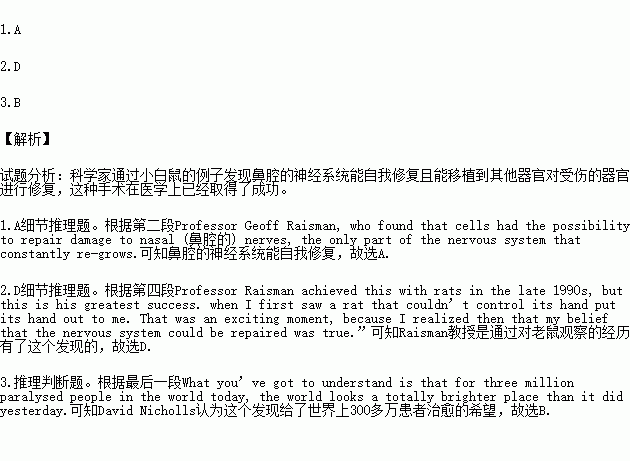题目内容
Darek Fidyka, a 38-year-old Bulgarian, had been paralysed (瘫痪的) from the chest down for four years after a knife attack. Scientists from Britain and Poland took cells from his nose, transplanted (移植) them into his back and re-grew his spinal cord (脊髓). Now he can walk and even drive a car. The doctors were delighted but said it was the first step in a long journey.
The breakthrough came after 40 years of research by Professor Geoff Raisman, who found that cells had the possibility to repair damage to nasal (鼻腔的) nerves, the only part of the nervous system that constantly re-grows. “The idea was to take something from an area where the nervous system can repair itself, and does so throughout life, and put it into an area that doesn’t repair itself,” Professor Raisman said.
Polish doctors injected the nasal cells into Mr Fidyka’s spinal cord above and below the injury and used some nerves from his ankle to form a bridge across the damaged tissue. The nasal cells appear to have caused the spinal nerves to repair themselves.
Professor Raisman achieved this with rats in the late 1990s, but this is his greatest success. “I think the moment of discovery for me was Christmas in 1997 when I first saw a rat that couldn’t control its hand put its hand out to me. That was an exciting moment, because I realized then that my belief that the nervous system could be repaired was true.”
Doctors chose the easiest case for their first attempt — it might not work for others. But there is a real sense of hope that an idea once thought impossible has been realized.
David Nicholls, who helped provide money for the breakthrough, said information about the breakthrough would be made available to researchers across the globe.
“What you’ve got to understand is that for three million paralysed people in the world today, the world looks a totally brighter place than it did yesterday,” he said.
1.Why did Professor Geoff Raisman choose cells from the nose?
A. The nervous system in the nose can repair itself.
B. Cells in the nose can be easily transplanted.
C. Cells in the nose re-produce rapidly.
D. He just wanted to give it a try.
2.What made Professor Geoff Raisman believe the nervous system can be repaired?
A. His study on animals.
B. His operation on a paralysed patient.
C. His sudden thoughts about Christmas.
D. His unusual experience with a sick rat.
3.David Nicholls’ words suggest that _____.
A. the world is becoming better and brighter
B. paralysed people have the hope of recovery
C. the report of the breakthrough will be published soon
D. researchers across the globe will carry out the operation

